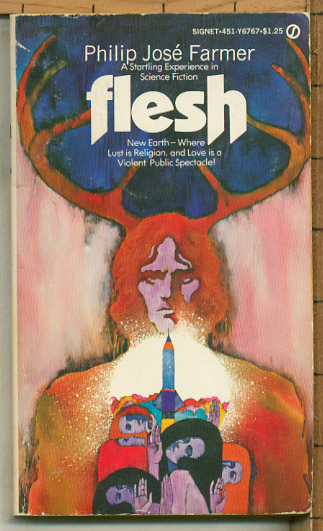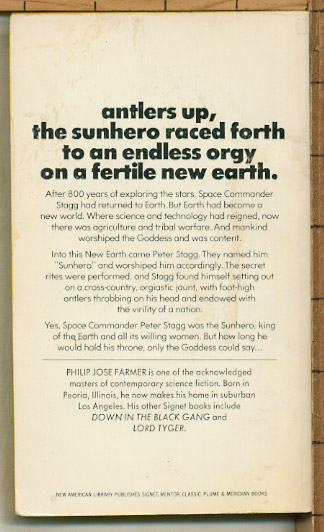
picture 2 of 2 Top

author:
title:
Farmer, Philip Jose
FLESH
1968 revision of 1960 book
edn-date:
printing:
format:
cvr art:
cvr price:
GRADING:
1974?
4th
Paperback
Bob Pepper
$1.25
near-Fine
Signet 4th printing early-Seventies paperback (copyright 1960.) Cover by Bob Pepper, 191 pages, $1.25 cover price. Condition is VG~ to near-Fine: tight and square with flat spine, very mild uniform age tanning; light overall wear. No stamps, marks or writing - a clean copy.
Philip Jose Farmer: Flesh - this is the expanded version from 1968, as compared to the Beacon edition of 1960. Even though I read and liked this years ago, I am relying on a pair of reviews by P. Schuyler Miller.
In 1969, Miller had this to say:
"Farmer was projecting some of the fertility rites of ancient time into our future, mixing in some molecular biology, and writing a bawdy but good yarn."
In 1961, he gave a review of the 1960 Beacon version, with a more complete plot summary:
"... A starship which has left Earth about 2100 A.D. returns after 8 centuries to find the planet a parched cinder, with a few oases of human civlization on a more or less pastoral level. This culture of the 30th century is based on a fertility cult that incorporates just about everything in "The Golden Bough," with embelishments from the author's fertile imagination. Peter Stagg, giant red-headed captain of the returned ship, promptly has antlers grafted on his skull, is adopted into the Elk fraternity, and as the year's "Sunhero" is launched on a 6 month's career of servicing every eligible "mascot" or virgin in the Deecee kingdom. His triumphal northward march will bring him to Albany at the summer solstice, where he the hideous Mother of Pigs will castrate and slaughter him, sending the Sun back into darkness from which a new Sunhero will rescure it at the winter solstice. For the surface reader in search of such entertainment, this is simply the story of one prolonged orgy - a dream fantasy made real - with colorful and plausible detail, and with a small amount of melodrama thrown in, as Stagg falls in love with a captured mascot from the pseudo-Catholic Casey kingdom of Boston, is taken prisoner by the Pants-Elf homosexuals of Pennsylvania... and is pursued by the hunting pigs of Mother Alba. Meanwhile, in subplots, Stagg's fellow spacemen try to fit themselves into the sex-centered society. Those who dig psychological symbolism can carry things to still another level, and delight in what the author says symbolically that he can't get by with in simple Anglo-Saxon. Finally, since Farmer is a serious writer, he is undoubtedly saying something about the psychological nature of man and human society, but quite without the finesse and suave subtlety of "Father" and "My Sister's Brother." After all, that's not what Beacon pays for."